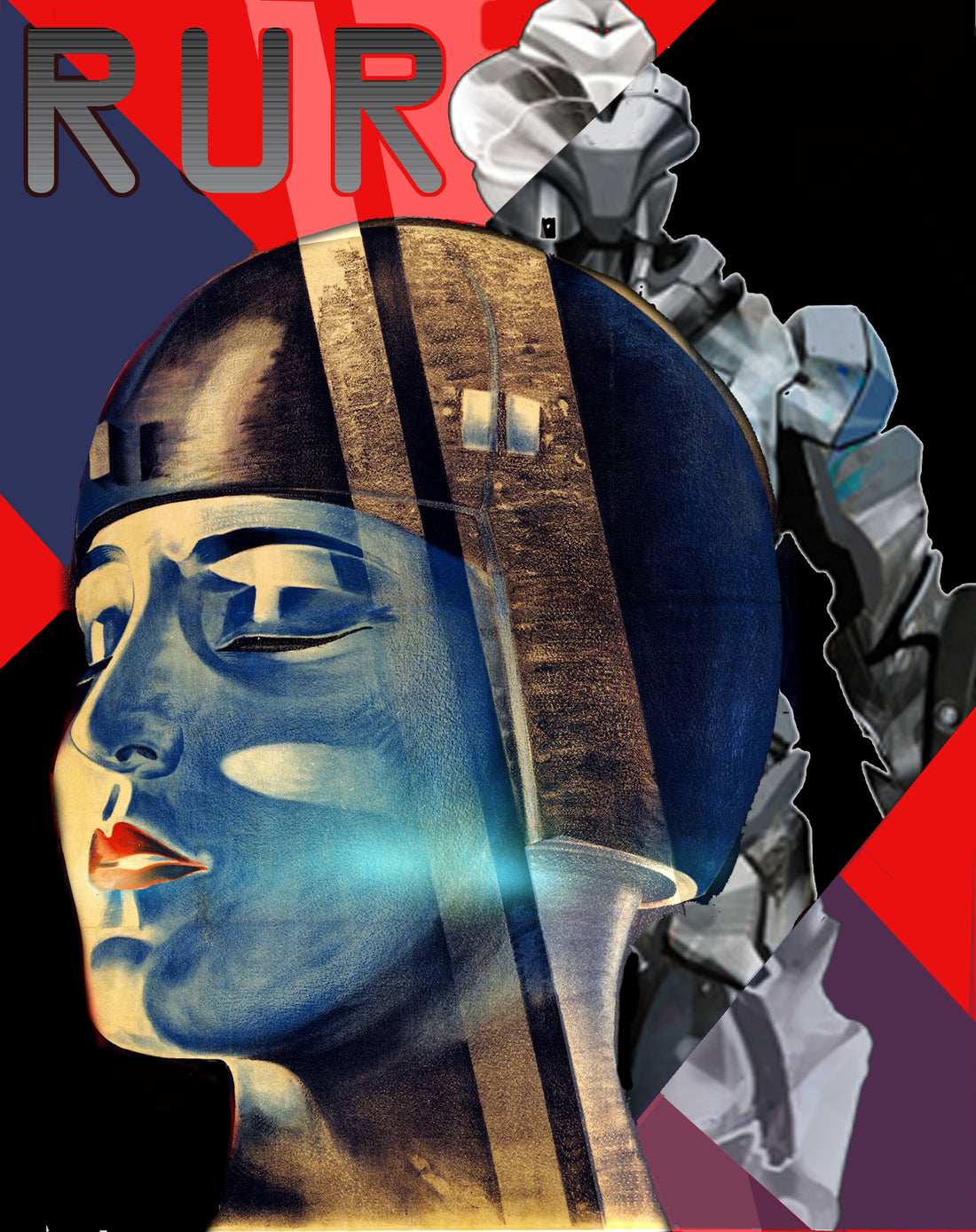Last year (2021), humans celebrated the 100 year anniversary of the introduction of the word 'robot' to the science-fiction audience.
But we, robots, are celebrating the 101 year anniversary of this event (obviously).
Max Leonard Hitchings, a human, celebrates with us and investigates the Czechoslovak origin of the word 'robot' in Karel Čapek's 1921 play Rossumovi Univerzální Roboti (Rossum’s Universal Robots).
‘Robots throughout the world. We, the first International organization of Rossum’s Universal Robots, proclaim man our enemy, and an outlaw in the universe.’ - Robot pamphlet, R.U.R.
In 1920, Karel Čapek, today one of the best-known Czech writers of the 20th century, wrote a play called Rossumovi Univerzální Roboti, or R.U.R. for short. The play premiered at the National Theatre in Prague in 1921 and is most famous for bringing the word ‘robot’ to a global audience. It was, in fact, Čapek’s brother, the painter and writer Josef Čapek, who suggested the word, which is derived from the Slovak word robota, meaning work.

In 1923, Paul Selver translated R.U.R. into English as Rossum’s Universal Robots, and it was adapted for the stage by Nigel Playfair. That year, it played in London, New York, Chicago and Los Angeles. It has since been performed many times, adapted for the radio, and in 1938 an excerpt was produced for BBC television (reputedly the first televisual science-fiction broadcast). It was even performed by Lego robots in 2015, however, astoundingly, it has never been turned into a feature film.
As I don’t speak Czech, this review focuses on the version that played at the Garrick Theatre, New York in 1923, and it should be noted that Selver did take some liberties with the text - in particular, removing a character. Those readers who can speak Czech are encouraged to seek out the original script.

R.U.R. takes place on an island, where the Rossum robot factory is based. It is set a few decades ahead, in a future in which we learn millions of robots have already been created, in two grades - skilled and unskilled, plus bespoke robots created for specific tasks.
The entire play is set in the main office of the company, where its director Domin works alongside various scientists and engineers. The office interior is luxurious, the walls are adorned with advertising placards (‘Robots cheapest Labor’), bottles of wine and spirits are on the shelves, and through the office window we can see telegraphy poles, wires and factory chimneys.
Domin sits at his desk, dictating letters of business to his robot assistant, Sulla. Another robot, Marius, enters and explains that a woman is here to see Domin. The woman, Helena Glory, would like a tour of the factory. Domin begins by explaining the history of the company - how Rossum, a great physiologist, came to this distant island as a young man, in order to study the ocean fauna. He experimented with a chemical synthetic process designed to imitate protoplasm, and discovered a substance which was just like living matter but with a different chemical composition, writing in his diary “Nature has found only one method of organizing living matter. There is, however, another method, more simple, flexible and rapid which has not yet occurred to Nature at all. This second process by which life can be developed was discovered by me today.” His early attempts to make lifeforms from this new matter were fairly disastrous, and took many years as he tried to make dogs and so on, but eventually he began work on a human being.
According to Domin, old Rossum was mad - he had a God complex, but young Rossum, his son, said that there’s little point in making a man if it takes 10 years - after all, nature does it quicker. The two would have terrible rows, but eventually Rossum Jr, himself an engineer, decided to redesign humanity in a more efficient way. Now the factory produces thousands of robots in one sitting, as the biomatter is ground into a paste, organs are created in vats, and nerves, veins, and intestines are woven on great spinning wheels.

‘A working machine must not play the piano, must not feel happy, must not do a whole lot of other things. A gasoline motor must not have tassels or ornaments, Miss Glory. And to manufacture artificial workers is the same thing as the manufacture of a gasoline motor.’
This capitalist attitude prevails throughout the play, as it is clear that the robots are viewed as unliving things - equipment or apparatus, not people. When Helena says that her town council bought some robots, then corrects herself and says ‘engaged the robots for work’ (as street sweepers), Rossum confirms her initial thought: ‘No. Bought them, Miss Glory. Robots are bought and sold.’
ROSSUM'S UNIVERSAL ROBOTS by Sam Chivers
Domin explains that there are two grades of robot - finer and coarser grades.
He asks Marius to bring in the strong, rough type, used for manual labour, and then Domin introduces Helena to his secretary Sulla, the finest grade of robot. He encourages Helena to touch her skin, which she is resistant to - in fact she doesn’t believe that Sulla is a robot, and so Domin offers to have her dissected, so that she can see within her. Helena finds this appalling, so Domin quizzes Sulla and Marius about their feelings concerning death - neither of them fear it. They will cease to move - that is all.
Despite this attitude, Domin actually has humanitarian pretensions, as he believes that with a fully mechanised workforce, nobody need ever go hungry or worry about money. In fact, he believes that ‘the servitude of man to man and the enslavement of man to matter will cease. Nobody will get bread at the cost of life and hatred. The Robots will wash the feet of the beggar and prepare a bed for him in his house.’
Helena reveals that she is actually a member of the Humanity League, and has come here with the aim of whipping the robots into a rebellion - she wants to liberate them. But Domin just laughs and says that they can’t be manipulated in this way - they don’t have souls, they don’t fear their own mortality, and they live to serve their human masters.

Now, it must be said that the sexual politics of this play are fairly abhorrent - Domin and many of the other scientists seem instantly infatuated with Helena, and Domin even proposes to her. When she says no, he pressures her further, and when she continues to refuse, he simply kisses her. I don’t think it’s giving the writer too much benefit of the doubt to suggest that this was intentional. One reading of this aspect of the play is that it serves to further illustrate the scientists’ disregard for others - if they can be so unfeeling about the robots, perhaps it follows that they are similarly gross in their attitudes to women. The play was written in the same year that the Czechoslovak Constitution was established, which guaranteed equal rights (and votes) for women, and Čapek, who studied philosophy and was a committed anti-fascist, may well have deliberately made Domin a caricature of a self-centred male - it is a dystopian play, after all. Sadly, this aspect of the play does seem dated, and poor Helena (who is clearly based on Čapek’s sister Helena, a pianist), has really very little agency throughout the play - and in many cases the men keep her in the dark about what’s going on in the world outside. Despite her protestations about the rights of the robots and her hopes to liberate them, she really isn’t able to do a great deal.

When the curtain rises on act two, 10 years have passed. By now, the robots are being used as soldiers, fighting wars all over the world, against their fellow kind and human citizens.
Domin, Helena and all the men stay in their offices, working on hybrid cyclamens, insulated from it all. Domin buys Helena a gunship, the Ultimus, to celebrate the 10 year anniversary of her arrival at Rossum.
Helena is able to read in a newspaper that robots (workmen, sailors, soldiers) have gathered at Havre and have sent out a manifesto to all robots around the world. She is also able to discover that due to the prevalence of robots, human fertility has dwindled and in fact the birth rate has just dropped to zero.
Helena pleads with Domin to close the factory, but he refuses. Instead he says that the problem is that they’ve been creating universal robots, instead of national robots. If they created different robots for different nations instead, and gave them different languages, then not only would this prevent them from unionising, but they’d actively hate each other. This is a strong scene that really shows the insidious way that Domin thinks.

This Promethean desire to create life ex nihilo that can be bent to one’s will is hubris writ large, and the play reaches its crescendo when robots arrive on the island, intent on destroying humankind to make way for a new aeon - the robot age.
It’s true that the main impetus for investigating this play is to discover the origin of the word ‘robot’, which is so ubiquitous today, and it’s fascinating to note that the description of Rossum’s robots is that of a manufactured biological being, not a mechanical one, making them actually more akin to the androids of Philip K. Dick’s Do Androids Dream of Electric Sheep? (or the replicants of its cinematic interpretation, Blade Runner), and the Cylons of the 2004 Battlestar Galactica series, than the likes of, say, Robbie the Robot, Maria from Metropolis, or C-3PO.

The most striking thing, however, is that right from the beginning, the plight of the robot has so often been that of the indentured worker, the slave; that of the second-class citizen; that of the oppressed, the hunted, the despised. It is bitterly fitting that Josef Čapek, a vocal critic of Hitler, was quickly captured when the Germans invaded Czechoslovakia in 1939 and was dispatched to Dachau, then Buchenwald, and finally to Bergen-Belson, where he died in 1945.
The legacy of both Čapek brothers lives on today, in the work of diverse authors from Isaac Asimov to Roger Zelazny, in films ranging from Alien to Chappie, and in TV shows from Star Trek to Westworld… wherever there are robots.



1 comment
Very Interesting read, Would love to see a production of this.